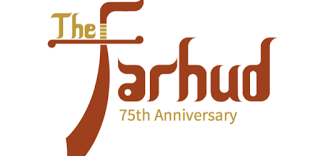
Dr. Nissim Kazzaz gave this witness testimony at the ceremony held on 6 June 2016 in the Knesset to mark the 75th anniversary of the Farhud. The Farhud is the pogrom against the Jewish population of Baghdad, Iraq, on June 1–2, 1941 during the Festival of Shavuot (Pentecost). You can see the video of the proceedings here and here. (With thanks: David Kheder Bassoon).
“I am Dr. Nissim Kazzaz. I was born in Iraq in 1930 and made aliya in 1946, with the Halutz movement. I have been married for 52 years and I have three children and nine grandchildren. I served in the Israel army for 29 years and completed my service with the rank of lieutenant-colonel. I studied History of the Middle East and Arabic Language and Literature at the Hebrew University of Jerusalem.
I lost my father Nahum Yossef Kazzaz, who was murdered on June 1st, 1941 during the pogrom in the Jewish community in Baghdad in which 180 people were murdered and thousands more were injured, raped and robbed.
In May 1941 when the war between Great Britain and Iraq began, things became tough for the Iraqi Jewish community. The community was terrified – facing unjustified arrests, physical assaults and murders. As a result, during this month, Jews attempted to keep a low profile. They did not attend to their shops, did not conduct business, and preferred to stay home at night behind locked doors.
During that month, my father and his partner Meir Khlef were unable to attend their silken and golden thread shop, which they owned at El Kazzazin market. My father was also unable to communicate with the Muslim owners of the stables where he kept his noble horses/ steeds.
On May 31st after Rashid Ali’s pro Nazi government and Haj Amin El Huseini had fled from Iraq, the Iraqi radio announced a ceasefire and the return of the Iraqi regent Amir Abed El Ileah to Iraq. Citizens were asked to go out to welcome him.
The joy amongst the Iraqi Jews was twofold. Not only was the rule of the pro- Nazi and anti-British government was over, that day also happened to be the Jewish holiday of Shavuot. Leaders and respected people from the Jewish community, dressed in holiday outfits, went out to welcome the regent. Others went out onto the streets of Baghdad, visiting friends and relatives and attending coffee shops to alleviate the accumulated stress they experienced in the preceding weeks.
On that day, before noon, my father and his business partner, Meir Khlif, went out to visit one of the stables where my father kept his horses. I was 11 years old at that time and I joined my father on this visit. My father partner’s brother, Naim, who was 25 years old at that time, joined us as well.
In the afternoon, after we completed our visit, the four of us took a minibus home. Meir took the seat by the driver, and Naim, his brother, sat on a bench behind him. My father and I took the back seat in the bus.
The minibus made its way along Ghazi Street. Suddenly, when it approached the Bab Ei Sheikh neighborhood, it was blocked by a mob that surrounded the bus. Some of the rioters managed to open the front door of the bus. They approached Meir, who had a very distinct Jewish appearance and attacked him, hitting him with opened fists. His brother, Naim, attempted to protect him by punching them back, but was unable to stop them from pulling his brother off the bus.
Meanwhile, as this was happening, my father, who sat by the rear left window, managed to get off the bus through the window. I watched him as he started to walk towards the other side of the street where it was less crowded. I tried to follow him by getting myself out of the bus through the same window. Half of my body and one leg were already out the window, but before I was able to jump out – the bus driver took off and drove the bus out of the area. I had to stay on the bus with Naim, leaving my father and his partner behind. This was the last time I saw my father.
I believe that my father’s actions were heroic. I am convinced that he got off the bus and walked towards the neighborhood in an attempt to get help to save his partner. I know that he had many acquaintances in that neighborhood since he employed many women who lived there as silk spinners for his silk business.
Unfortunately he was unable to help his partner and he paid for his heroic attempt with his life.
The bus driver dropped Naim and me at our homes at the Jewish quarter. As we walked home, we noticed that the houses were locked and the streets were empty. There was not a soul outside. We announced the horrible news to our families.
Grief and sadness filled our souls and our lives were forever altered.”

Leave a Reply